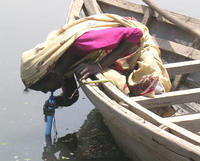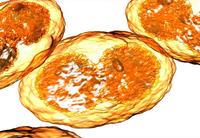-
Method used in hunting serial killers can be used against killer diseases
Geographic profiling, a method used in the hunt for serial killers, can help combat infectious diseases; the statistical technique uses the locations of crimes to identify areas in which the serial criminal is most likely to live and work; it was originally developed to help police prioritize suspects, but can now be used to map the locations of diseases to try and identify the source of the disease
-
-
Decision on smallpox virus destruction delayed for three years
After a second round of negotiations Tuesday, the World Health Assembly (WHA) agreed to postpone setting a date for destruction of the world’s remaining smallpox virus stocks for another three years; the assembly simultaneously reaffirmed previous statements that the virus stocks should be destroyed after “crucial research” is completed; several countries, mainly developing ones, pushed for immediate destruction of the smallpox virus stocks, while others suggested a short delay for setting a deadline; U.S. officials had introduced a resolution to retain the virus stocks for at least another five years to allow work on bioterrorism countermeasures to continue; U.S. Secretary of Health and Human Services (HHS) Kathleen Sebelius said, however, that the United States was committed to the eventual destruction of the virus stocks
-
-
New device could help stop one of the world's deadliest killers

A new portable and low cost water sanitation device could help save millions of lives each year; water borne diseases contracted from contaminated water are one of the world’s leading causes of death; each year nearly two million people die, primarily young children, from preventable diseases like diarrhea, cholera, and typhoid from drinking unsafe water; it is estimated that roughly 1.1 billion people lack access to clean water, but all that could potentially change thanks to Torben Frandsen’s LifeStraw; LifeStraw is a 10 inch long straw that is capable of generating 185 gallons of clean water, requires no electricity, and can be cheaply manufactured
-
-
Fate of last smallpox virus samples to be determined today

The World Health Organization officially declared in 1979 that smallpox has been eradicated; in the three decades since the WHO declaration, the Centers of Disease Control and Prevention (CDC) in Atlanta, Georgia, and a Russian government laboratory near Novosibirsk have been the last two places to keep samples of the smallpox virus; during this time, there have been many calls by scientists and advocates to destroy these last samples — some of these calls accompanied by dark hints that the two countries wanted to hang on to the samples in order to use them as a basis for a future bio-weapon; the United States opposes the destruction, saying that the live samples are needed to develop vaccine with less adverse side effects as well as two other related drugs; a committee of the World Health Organization is meeting today in Geneva to make a decision
-
-
CDC instructs on preparations for Zombie Apocalypse
There are many exotic diseases the Atlanta-based U.S. Centers for Disease Control and Prevention (CDC) is investigating, and about it which it warns Americans; few followers of the health agency were prepared for its latest post: “Preparedness 101: Zombie Apocalypse”; the post, written by Assistant Surgeon General Ali Khan, instructs readers how to prepare for “flesh-eating zombies” – zombies similar to those one sees in movies like “Night of the Living Dead” and video games like Resident Evil; CDC spokesperson said: “It’s kind of a tongue-in-cheek campaign—- We were talking about hurricane preparedness and someone bemoaned that we kept putting out the same messages”
-
-
Secrets of plague unlocked with stunning new imaging techniques
Sandia Labs researchers have developed a super-resolution microscopy technique that is answering long-held questions about exactly how and why a cell’s defenses fail against some invaders, such as plague, while successfully fending off others like E.coli
-
-
HHS awards SIGA Technologies smallpox contract worth up to $2.8 billion
New York-based SIGA Technologies has signed a 5-year, $433 million contract with the U.S. Department of Health and Human Services (HHS) to deliver two million courses of the company’s smallpox antiviral, ST-246, to the Strategic National Stockpile; the contract includes options that would raise the contract’s total value to approximately $2.8 billion if these options are fully exercised
-
-
Kansas House cuts troubled agency's role in funding of bio lab
DHS has chosen Kansas State University (KSU) in Manhattan, Kansas, as the location for the new, $650 million Level 4 BioLab, which will replace the aging lab on Plum Island, New York; the federal laboratory will be the U.S. premier facility for research into countering possible bioterrorism attacks and threats to the nation’s food supply; the Kansas Bioscience Authority (KBA) was supposed to handle the issuing of $105 million in bonds to develop the lab, but the KBA’s chief executive has recently resigned under a cloud, and the agency’s business practices are now being investigated the Johnson County District Attorney; the Kansas House voted to cut the KBA out of handling the bond issue; “We didn’t want any kind of hint of a problem,” said one House member
-
-
New insect repellant may be thousands of times stronger than DEET
The Bill & Melinda Gates Foundation has been supporting a major interdisciplinary research project to develop new ways to control the spread of malaria by disrupting a mosquito’s sense of smell; as part of the project, Vanderbilt University researchers developed an insect repellant which is not only thousands of times more effective than DEET — the active ingredient in most commercial mosquito repellants — but also works against all types of insects, including flies, moths, and ants
-
-
Researchers use app to map spread of infectious diseases
Researchers in the United Kingdom are using cell phones to map how infectious diseases are spread to help tailor public health policies during a mass outbreak; researchers developed a special app, called FluPhone, for mobile phones that gathered medical data from the user as well as information on how they interacted with other people; the app provides a scientific method for measuring the social activity of an entire population in real-time; FluPhone app can also be used to run simulations on how a disease would actually spread
-
-
Foot-and-mouth disease control measures could be reduced
A new study of foot-and-mouth disease shows that cattle afflicted with the virus are only infectious for a brief window of time — about half as long as previously thought; this finding suggests that the controversial control measures used to halt the disease’s spread, such as killing large numbers of livestock, could be reduced
-
-
A "whole-system redesign" of U.S. agriculture
Transformative changes in markets, policy, and science, rather than just incremental changes in farming practices and technology, will be critical if the United States is to achieve long-term sustainability in agriculture, according to a nationwide team of agriculturists that includes a University of California, Davis, animal scientist
-
-
U.S. agriculture escaped impacts of global warming -- for now

Global warming is likely already taking a toll on world wheat and corn production, according to a new study led by Stanford University researchers, but the United States, Canada and northern Mexico have largely escaped the trend; the researchers found that global wheat production was 5.5 percent lower than it would have been had the climate remained stable, and global corn production was lower by almost 4 percent; Global rice and soybean production were not significantly affected
-
-
Asthma cases rising, researchers do not know why

Despite efforts in the United States to improve air quality, recent research shows that asthma rates are on the rise, leaving public health officials baffled; on Tuesday, the U.S. Centers for Disease Control and Prevention (CDC) announced that from 2001 to 2009 an additional 4.3 million people had been diagnosed with asthma; in 2001, 7.3 percent of the United States suffered from asthma, but in 2009 that number grew to 8.2 percent; black children saw the largest increase in asthma rates, growing nearly 50 percent over the last decade
-
-
Risk of agroterrorism growing
The United States imports so much of its food and food ingredients from other countries, that terrorists have many more opportunities to harm Americans and damage the U.S. economy; a high FDA official said that increased U.S. attention to the issue and questions over whether hostile actors have the technical capacity to mount such an attack notwithstanding, the likelihood of being poisoned by intentionally contaminated food is growing
-
More headlines
The long view
We Ran the C.D.C.: Kennedy Is Endangering Every American’s Health
Nine former leaders of the Centers for Disease Control and Prevention (CDC), who served as directors or acting directors under Republican and Democratic administrations, serving under presidents from Jimmy Carter to Donald Trrump, argue that HHS Secretary Roert F. Kennedy Jr. poses a clear and present danger to the health of Americans. He has placed anti-vaxxers and conspiracy theorists at top HHS positions, and he appears to be guided by a hostility to science and a belief in bizarre, unscientific approaches to public health.
